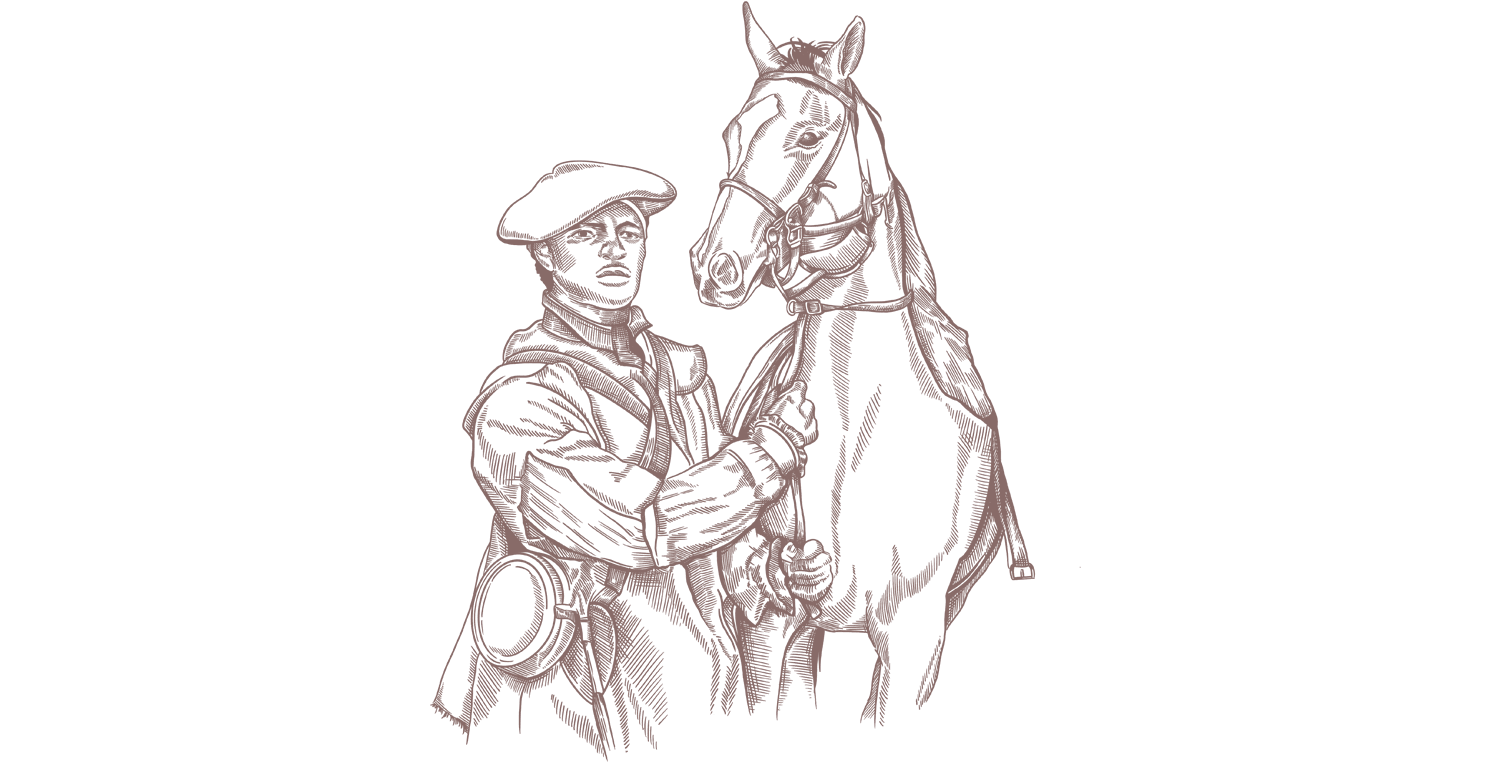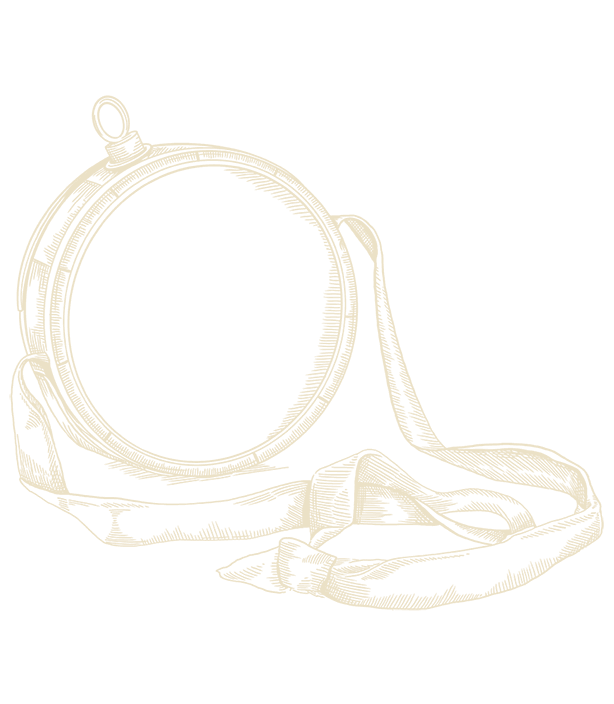
The contribution of Patriots such as Andrew Ferguson reflected the distinct ways that certain independent Blacks could leave their mark on early American society through dedicated service to country. Private Andrew Ferguson was a free Black man who fought in the Revolutionary War effort against the British.1 It is believed that Ferguson was born circa 1760 in Dinwiddie County, Virginia, though some sources indicate that the year was 1765.2 A child of free Black parents3 and drafted into the war on the American side in 1780, he fought in several theatres including the battles of Brandywine, Kings Mountain and Cowpens.4 He was severely wounded at the Battle of Guilford Court House; however, he later fought at the Siege of Ninety Six and the Battle of Eutaw Springs.5 In total, Andrew’s pension application indicates that he served five years and six months.6
In retrospect, Ferguson provides an interesting comparison to other Patriots of Color when considering how he came to join the war. He and his father, Andrew Peeleg Ferguson, were captured (presumably in Virginia) by British forces and, as a consequence, the British attempted to impress them into war service for the king.7 This was not unusual, for the British approached those they assumed to be enslaved Blacks for information, or to attempt to recruit them for their side of the conflict with a promise of freedom to the enslaved if they fought for the British.8 Such press-ganged Blacks were typically put on work details.9 However, Andrew, then 15, and his father refused to help the British, and were beaten as a result.10 Upon escaping from the British, they met up with and joined the Continental Army troops stationed in Virginia under General Nathanael Greene.11
Sources
“Patriot Wand at Tree,” National Park Service, accessed April 10, 2022, https://www.nps.gov/cowp/planyourvisit/upload/Patriot-Wand-at-Tree.pdf.
Ernest Rollins, “Andrew Ferguson: Area’s Only Known Black Revolutionary War Hero,” The Times-Mail (Bedford, IN), March 11, 2018. Ferguson is buried in Bedford, IN. It should be noted that the Sons of the American Revolution chapter of Bedford, IN, which is responsible for locating and marking the Revolutionary War soldiers’ graves in the vicinity, decided upon 1765 as the year of Ferguson’s birth.
“Patriot Wand at Tree,” National Park Service, https://www.nps.gov/cowp/planyourvisit/upload/Patriot-Wand-at-Tree.pdf.
“Patriot Wand at Tree,” National Park Service, https://www.nps.gov/cowp/planyourvisit/upload/Patriot-Wand-at-Tree.pdf.
“Patriot Wand at Tree,” National Park Service, https://www.nps.gov/cowp/planyourvisit/upload/Patriot-Wand-at-Tree.pdf.
Ernest Rollins, “Andrew Ferguson: Area’s Only Known Black Revolutionary War Hero,” The Times-Mail.

What can be said about the life and contributions of Andrew Ferguson? His historic and, in many ways, unprecedented journey as a Black Patriot highlighted the loyalty some free Blacks felt toward America during the war.
Of all the battles that Andrew the younger participated in, his role in the Battle of Kings Mountain was especially noteworthy because that conflict is considered a turning point for the Patriots during the Southern Campaign of the Revolutionary War.12 It was a battle between Loyalist and Patriot militias and was the first major Patriot victory following the British invasion of Charleston, South Carolina in May 1780. At least one dozen Black soldiers participated in the fighting,13 but only five have been identified so far,14 one of which, of course, was Andrew.
After reenlisting several times as a soldier for other theatres of the war, and after sustaining injuries to both his leg (at the Battle of Camden15) and head (at the Battle of Guilford Court House 16), Andrew retired from service and worked in North Carolina, briefly returned to Virginia, and then moved to southern Indiana.17 He initially settled in Vincennes, but later relocated to Bloomington.18 In Vincennes Andrew applied for his pension; however, he was denied because he was Black, only later securing the pension in Bloomington in 1838 while continuing to work odd jobs to supplement what his pension provided. He married Jane “Jenny” Murphy in 1844, and eventually learned that he was eligible for a land grant of 160 acres.19 Unfortunately, the final approval for it came seven months after his death in 1855, and as his wife had also died and they had no heirs, the acres pledged to Ferguson went back to the government.20
What can be said about the life and contributions of Andrew Ferguson? His historic and, in many ways, unprecedented journey as a Black Patriot highlighted the loyalty some free Blacks felt toward America during the war. Perhaps due to his free status, Andrew’s decision to fight for America seemed to suggest that such Blacks saw themselves firmly as Americans and recognized a common, shared enemy in the British. Although the American government would initially withhold what was due to Andrew because of his race, his allegiance to America, his bodily sacrifice, and his commitment to work and service personified the very best of American patriotism.
Sources
Randell Jones, “The Other Ferguson at the Battle of Kings Mountain,” Gaston Gazette (Gastonia, NC), October 6, 2016.
Ernest Rollins, “Andrew Ferguson: Area’s Only Known Black Revolutionary War Hero,” The Times-Mail.
Randell Jones, “The Other Ferguson at the Battle of Kings Mountain,” Gaston Gazette.
Ernest Rollins, “Andrew Ferguson: Area’s Only Known Black Revolutionary War Hero,” The Times-Mail.
Ernest Rollins, “Andrew Ferguson: Area’s Only Known Black Revolutionary War Hero,” The Times-Mail.
Ernest Rollins, “Andrew Ferguson: Area’s Only Known Black Revolutionary War Hero,” The Times-Mail.
Ernest Rollins, “Andrew Ferguson: Area’s Only Known Black Revolutionary War Hero,” The Times-Mail.
See Si Sheppard, Patriot vs Loyalist: American Revolution 1775–83 (Oxford: Osprey Publishing, 2022), 65.
Randell Jones, “The Other Ferguson at the Battle of Kings Mountain,” Gaston Gazette.
Randell Jones, “The Other Ferguson at the Battle of Kings Mountain,” Gaston Gazette.
Randell Jones, “The Other Ferguson at the Battle of Kings Mountain,” Gaston Gazette.
Randell Jones, “The Other Ferguson at the Battle of Kings Mountain,” Gaston Gazette.
Randell Jones, “The Other Ferguson at the Battle of Kings Mountain,” Gaston Gazette.
Randell Jones, “The Other Ferguson at the Battle of Kings Mountain,” Gaston Gazette.
Sources
“Patriot Wand at Tree,” National Park Service, accessed April 10, 2022, https://www.nps.gov/cowp/planyourvisit/upload/Patriot-Wand-at-Tree.pdf.
Ernest Rollins, “Andrew Ferguson: Area’s Only Known Black Revolutionary War Hero,” The Times-Mail (Bedford, IN), March 11, 2018. Ferguson is buried in Bedford, IN. It should be noted that the Sons of the American Revolution chapter of Bedford, IN, which is responsible for locating and marking the Revolutionary War soldiers’ graves in the vicinity, decided upon 1765 as the year of Ferguson’s birth.
“Patriot Wand at Tree,” National Park Service, https://www.nps.gov/cowp/planyourvisit/upload/Patriot-Wand-at-Tree.pdf.
“Patriot Wand at Tree,” National Park Service, https://www.nps.gov/cowp/planyourvisit/upload/Patriot-Wand-at-Tree.pdf.
“Patriot Wand at Tree,” National Park Service, https://www.nps.gov/cowp/planyourvisit/upload/Patriot-Wand-at-Tree.pdf.
Ernest Rollins, “Andrew Ferguson: Area’s Only Known Black Revolutionary War Hero,” The Times-Mail.
Randell Jones, “The Other Ferguson at the Battle of Kings Mountain,” Gaston Gazette (Gastonia, NC), October 6, 2016.
Ernest Rollins, “Andrew Ferguson: Area’s Only Known Black Revolutionary War Hero,” The Times-Mail.
Randell Jones, “The Other Ferguson at the Battle of Kings Mountain,” Gaston Gazette.
Ernest Rollins, “Andrew Ferguson: Area’s Only Known Black Revolutionary War Hero,” The Times-Mail.
Ernest Rollins, “Andrew Ferguson: Area’s Only Known Black Revolutionary War Hero,” The Times-Mail.
Ernest Rollins, “Andrew Ferguson: Area’s Only Known Black Revolutionary War Hero,” The Times-Mail.
Ernest Rollins, “Andrew Ferguson: Area’s Only Known Black Revolutionary War Hero,” The Times-Mail.
See Si Sheppard, Patriot vs Loyalist: American Revolution 1775–83 (Oxford: Osprey Publishing, 2022), 65.
Randell Jones, “The Other Ferguson at the Battle of Kings Mountain,” Gaston Gazette.
Randell Jones, “The Other Ferguson at the Battle of Kings Mountain,” Gaston Gazette.
Randell Jones, “The Other Ferguson at the Battle of Kings Mountain,” Gaston Gazette.
Randell Jones, “The Other Ferguson at the Battle of Kings Mountain,” Gaston Gazette.
Randell Jones, “The Other Ferguson at the Battle of Kings Mountain,” Gaston Gazette.
Randell Jones, “The Other Ferguson at the Battle of Kings Mountain,” Gaston Gazette.
More Patriot Profiles
Jack Congo
The course of the life of Jack Congo (alternatively, Congo Jack) showed how the relationship between slavery ...
Drury Walden
Perhaps surprisingly, there were Patriots of Color who enlisted in the American Revolutionary War as free men—even ...
Archibald Artis
Patriot of Color Archibald Artis offers a particularly special window into the world of Revolutionary military service ...
